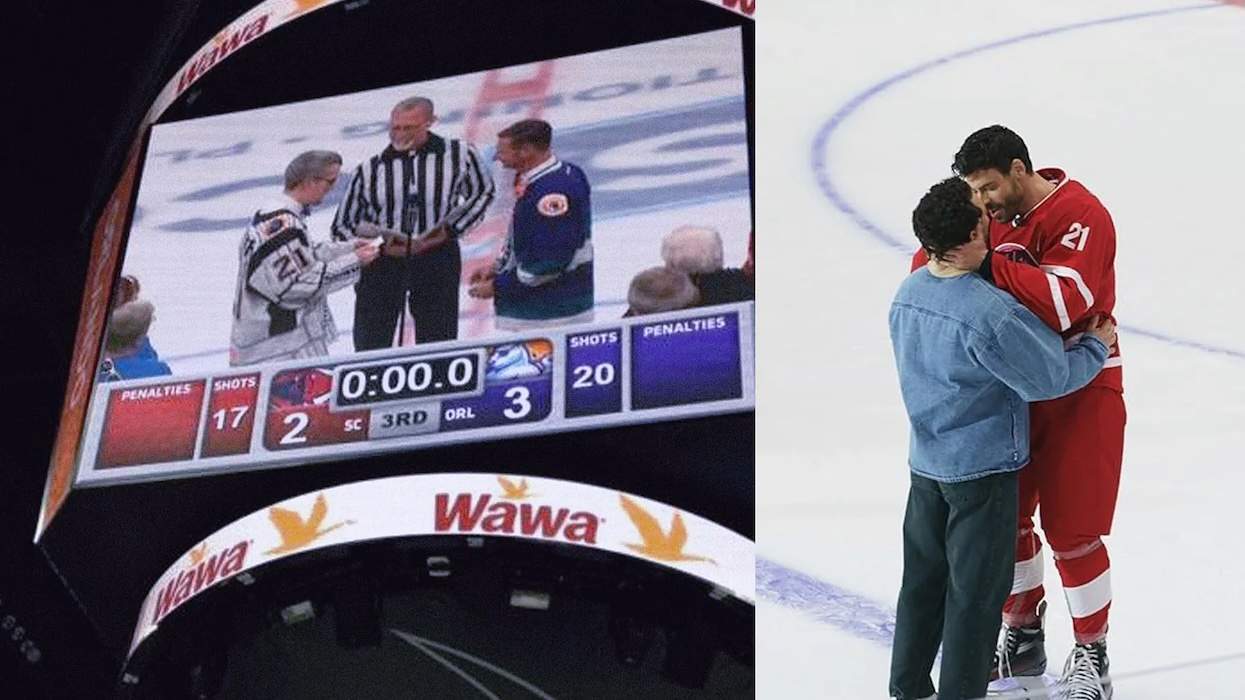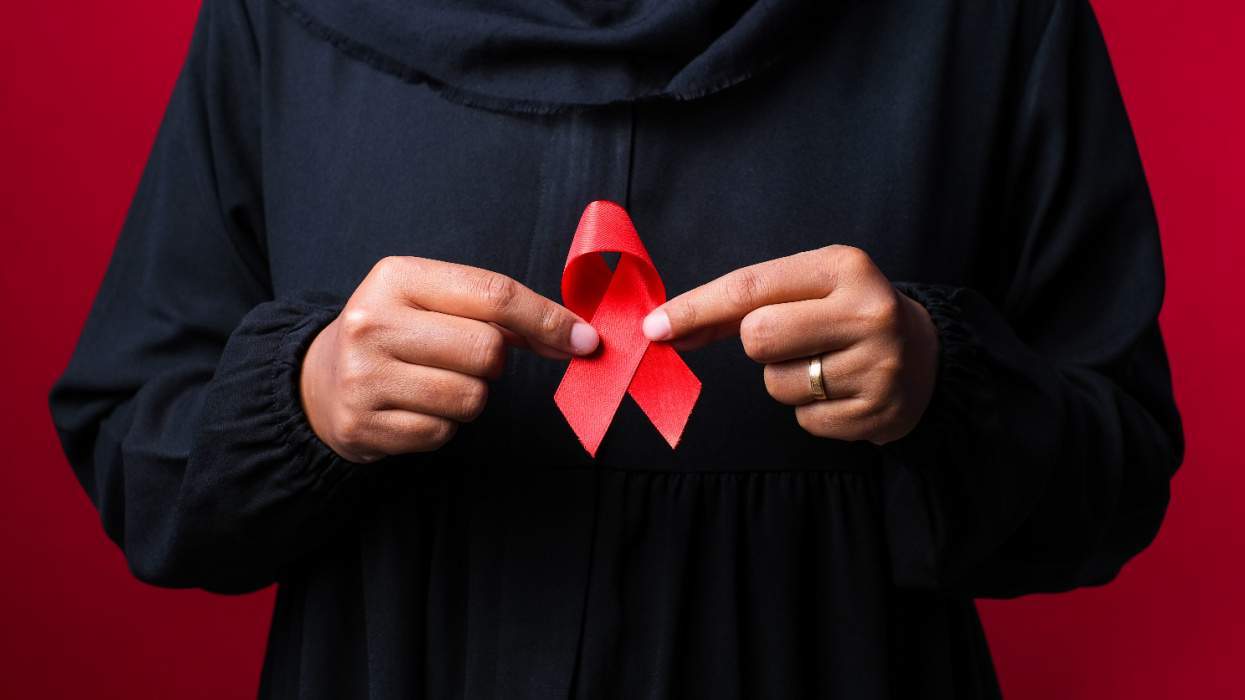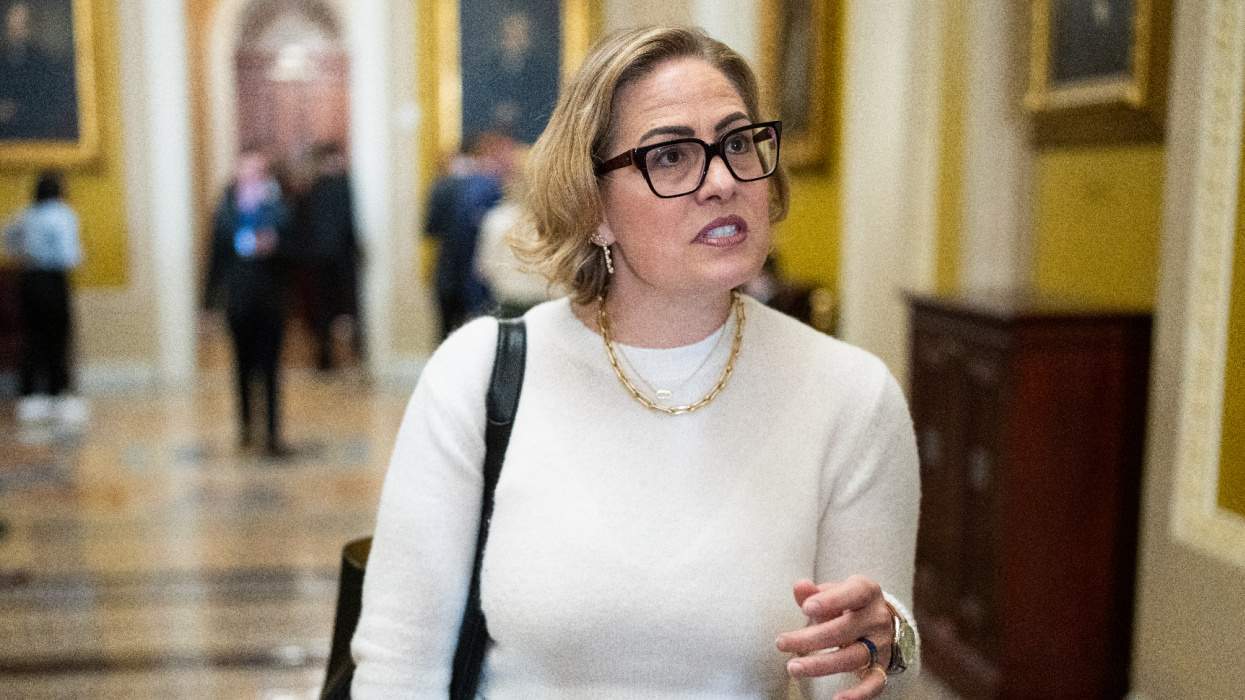The Stonewall Inn was a dump. This is according to Jay Toole, a veteran of the now mythical uprising. "It was dark, smelly. You never drank any mixed drinks there ever because they hardly had any running water, so glasses were always washed in dirty water."
Toole was living nearby in Washington Square Park after her parents threw her out of the house at the age of 13. She and the others who were sleeping there heard what was going and rushed over, beginning "one of the best nights I've ever had," she says. "It felt so empowering to be able to yell at a cop and not get beat up...Just to yell at them and scream at them and throw things at them and see them scared. You could see it in their eyes that they were scared. And it must have surprised them that they were scared of a bunch of gay people, like 'What the hell?'"
While living in the park as a teen, Toole dated a girl, Linda. She'd come into the park and Toole would make sure to "let the other butches know, 'She's mine.'" They dated and Toole quickly fell in love with her, even buying her a ring, but they lost touch after Linda's parents had her put away for being a "wayward girl." Their love story ended there, at least for the next 55 years. Then 2019 came around and Linda reconnected with Toole over email after seeing her in a video online commemorating the 50th anniversary of Stonewall. "I got on a plane and went to Florida so fast to see her that it made my head spin. And now she's back up here in New York with me and now we're snowbirds."
On this week's episode of LGBTQ&A, Jay Toole talks about reuniting with Linda after 55-years apart, surviving on the streets of New York City for over 25 years, and the Stonewall Uprising.
"Even though I'm talking about my history, there's so many more out there that are my history. It's our history."
You can read an excerpt below and listen to the full interview on Apple Podcasts.
Jeffrey Masters: You went to Washington Square Park after your parents kicked you out. Was that a place commonly known that kids without a place to stay could go?
Jay Toole: I knew that there was people like me that were down. I didn't talk to anybody for days because I was scared shitless, man. I was in those bushes with the rats and the squirrels and everything else. And these other kids came over to me and they asked me if I was hungry. I joined that little family. And there were so many homeless queer kids out there as is today, but back then that one section of the park was just queerness. It was just gay. And everybody had their own little family sections. It was amazing.
JM: This family welcomed you into theirs.
JT: Yeah, they did. They taught me how to survive out there, how to make money, how to get food, how to steal, how to rob people. It was survival. It was nothing but survival. There's no judgment. Kids are still doing this today. Queer kids are still out on the streets, surviving any best way that they can, the way I did 50-something years ago.
Back then as a kid, elders would come through the park, queer elders, and would give us food, give us money, sometimes take us home with them for showers and a meal. And sometimes it was out of the goodness of their hearts and sometimes it was for sex. And that's OK. It's how we lived.
JM: Did you feel safe?
JT: It was safe in that one segment. You never went to the bathroom there by yourself. You'd always go there with your crew because you didn't know who was in there, who was waiting for you to walk in, that would come in behind you. A lot of queer people have been raped in there and beaten.
The cops never bothered us. They didn't care. We weren't causing problems. We were just sleeping, doing our drugs, but we didn't bother anybody.
JM: How were you making money back then?
JT: Well, we robbed stores, we robbed people, I became a very good pickpocket. And then on McDougal, some of the restaurants hired us as cleaning up the tables and things like that for food. And then I got a job with the mafia. They ran a pizza place on McDougal, right off West 3rd. I was running numbers, me and my friend were running numbers for them.
A funny story is that me and my friend thought it was a good idea not to bring the money back to the guys. So we took the money that we had and we got the whole park stoned. And the next night we saw one of their guys coming into the park and all you could hear was pop, pop, pop. Now, if he wanted to kill us, he would've killed us. Just wanted to scare us. But the next morning we were on our hands and knees, literally on our hands and knees, in front of that pizza shop, waiting for them to come open it up. I was like, "Please don't kill us. We'll get you your money back."
So they didn't kill us, but they did give us a job and we started dealing heroin in the neighborhood. And we didn't mind because I was a heroin user by then. Years later, maybe in '65, '66, I ran into him again and he said, "You're looking for a job?" And I said, "Yeah." He says, "I'm running this lesbian bar. It's a speakeasy. You want to be the bouncer there?" I said, "Sure."
Cafe Bohemia, 15 Barrow Street.
JM: You must have been pretty young to be a bouncer.
JT: I was chicken shit then.
JM: I was going to say, you wouldn't have intimidated me at the door.
JT: Oh, back then, man, I would've. You'd walk in the front of the bar and it would look like a regular bar. And then you'd open up this door and you walk into this lesbian nirvana, man. And I'd sit up on the stage and there was a jukebox in the corner and it was illegal for us to be served alcohol, so it was bring your own. When the cops would come to raid it, the guy in front would hit the button under the bar and a red light would go in the back room where I was. That was for me to make sure that two girls weren't dancing, there was no alcohol on the table, the jukebox would either go off, just make sure everybody was as safe as possible.
But you knew that once the cops came in, they weren't going to go out by themselves, that somebody was going to go with them. They were not leaving there by themselves. Somebody was going to go and you just hoped it wasn't fucking you.
JM: Did you have an ID back then?
JT: I did. It wasn't mine. I used to pass and it was Melvin somebody. I had a guy's ID.
JM: With your short hair and your button-up, you were going by Melvin.
JT: Yeah. And chest binder and everything, yeah. They just thought I was a short, little young guy.
JM: Amongst the family you had at the park, was there dating and hooking up?
JT: Oh yeah, of course. The woman I'm with now, I met in '64, '65 at the Club Bohemia. When she'd come into the park, I'd just make sure I'd say, "There's the girl." And that would let the other butches know, "She's mine."
We were together for a while and because of some police interference, her family had her put away as a wayward girl. I thought she didn't love me anymore and she didn't come back. And then in 2019, I get this email...I did an interview for Democracy Now! And she saw me and she sends me an email, "Are you her? Did you live in the Bronx? Did you have monkeys?" And I wrote back, I said, "Yeah, that's me. Is this Linda?"
And we're back together. 55-years later, here we are living together, living our life. And our love is like...we just knew. It was like, "Oh my God." I got on a plane and went to Florida so fast to see her that it made my head spin. And now she's back up here in New York with me and now we're snowbirds.
JM: You met this woman in the '60s and had a crush on her. And now you're dating again.
JT: Oh, I was in love with her. I bought her a ring. It's quite the love story. It's like, never give up. We didn't break up. We didn't have an argument. It was just some outside things. And maybe that was good because we probably would've killed each other back then.
JM: Living on the street for almost 30 years, how did that imprint itself on you in ways that still show up today?
JT: Well, I can't walk past a homeless person without giving money or a cigarette, because I know what it's like to be out there. People walk past you all day long. They don't see the homeless. And I tell people, "You don't have to give money. You just walk by and say, 'Hey.'" You don't have to give anything. You don't have to stay there and have a big conversation with people. Just let us know that you've seen us.
I was in the throws of alcoholism and drug addiction back then, so I don't think it bothered me as much. But now that I look back on it, I've been out of homelessness, what, 20 years I think, and you don't trust anybody. It took me a long time to trust people, to actually have a conversation with people.
JM: What was that process like for you to finally stop living on the streets?
JT: Well, I was dying and then they put me in this place in the late '90s. And it was a good shelter. Shelters are bad, bad, bad, but this was one of the better ones. The director was queer, my social worker was cool. I'd keep on leaving the shelter and going out and smoke crack and come back. My social worker wouldn't say nothing to me, she'd lean into my ear and say, "It's your choice." And I never heard it, I never heard that it was my choice.
So I went out this one night and these kids in front of Madison Square Garden walked past me and said something really derogatory to me and I said something back to them. And they had these small lead pipes and beat me in my head. Oh, I mean, one of the worst beatings I've ever had. This rookie cop grabbed me and they put me in a hospital. And it was there, when I started waking up and all bandaged up and everything, it was there that it was like, "Oh, it's my choice." I don't have to go out there and get high and get beaten up and maybe murdered, like so many other people that I knew were killed out there.
When it was time to leave the hospital, I had a few dollars in my pocket, I walked out of that hospital and walked from the 70s to the 40s. And I just kept on saying, "Well, you can buy a six pack of beer. You can buy a couple of hits of crack."And I just kept telling myself, "Nah, wait until the next corner." And I got back to the shelter without picking up and I never picked up crack again or heroin or pills.
JM: Before we get to Stonewall, can you describe what the bar was like?
JT: Oh, what a dump. It was a dump back then. It's not too much better now.
You walk in. It was dark, smelly. You never drank any mixed drinks there ever because they hardly had any running water, so glasses were always washed in dirty water. So you either brought your own little bottle...but yeah, you didn't buy any mixed drinks in there.
The bar now is only one section, back then it was two sections. And there was an alcove in the back where you'd walk in the bar and then maybe halfway through, you could swing into the other room of Stonewall and that's mostly where we hung out. Music was always blasting, people were dancing. We were at home where we could be ourselves and hold each other and dance together.
JM: The night of the uprising, you were sleeping in the park when you heard about it. Do you remember specifically what you heard? Police raids were common, so what did you hear that told you that what was happening was something unique?
JT: Yeah. We didn't have cell phones back then and everything was by word of mouth. And The Village, man, you couldn't keep a secret in The Village if you wanted to. You just couldn't. So word came into the park, they said something's going down at Stonewall. And just by the sound of it, if it was a raid and somebody was just coming, OK, but this was different and we went up there.
Now when we got there, things had happened already. People were arrested. Oh my God, the streets were just yelling. It felt so empowering to be able to yell at a cop and not get beat up. And a lot of people did get beat up that night, but just to yell at them and scream at them and throw things at them and see them scared. You could see it in their eyes that they were scared. And it must have surprised them that they were scared of a bunch of gay people, like "What the hell?"
JM: It sounds like utter madness, but fun madness.
JT: It was. I think it was one of the best nights I've ever had when it came to doing things like that. And I look back on it for that one little moment, even though we didn't like each other or get along with each other maybe, that one moment in time, we all came together, all of us came together to say, "Enough is enough. You got to stop. You have to stop beating us. You have to stop arresting us. You just have to stop and let us live."
Again, being homeless and an addict, every day we were fighting for our lives with the cops. Most of my ribs have been broken multiple times by cops and fighting for who I believed in, which was myself, "This is who I am. I'm not going to change."
JM: Once you did finally get that first apartment in Brooklyn, did it take a while to adjust to that?
JT: I stayed in my apartment for a month with no lights because I was embarrassed to ask somebody, "How do you turn lights on?" I was too embarrassed. "Well, you have to go to the electric company." Well, I went to the electric company.No one told me that I have to bring a lease with me, no one told me that I needed credit. I didn't know any of this stuff. And when I went to work in the shelter system and doing the work for QEJ [Queers for Economic Justice], one of the things we would go through was ADL, Adult Daily Living. It's like, "When you get out, this is what you have to do. Don't get stuck."
Because if you're homeless for that long, you don't know. You don't know how to do the washing machine. I didn't know what a cell phone was. We were living on 31st Street and one day we noticed these people. And because we were close to Bellevue, we thought that they let everybody out of Bellevue because they were talking to themselves, not even realizing that these were cell phones they were talking into. That's how far out of all of communication we were with people. All you know is your homeless family. And we all knew the same thing: survive.
JM: Are there parts of living on the street that you miss?
JT: Yes. Paying bills. I didn't have to pay any bills back then. I have everything on auto because I probably wouldn't remember. I miss the air, sleeping outside in the air.
JM: When was the last time you slept outside, by choice?
JT: When I went down to see Linda, we slept on a trampoline. We're in our 70s and we're on a fucking trampoline. Are we insane or what? And we slept out on the trampoline.
I couldn't sleep out there anymore. It's brutal. It's so hard on your body. The people that I see out there now and it seems like so many more. It just breaks my heart when I see them or talk to them. They're thrown out for the same reasons I was thrown out. We've just got to do better. As adults, we know better. We just don't do it. People have to know of the history because even though I'm talking about my history, there's so many more out there that are my history. It's our history. And people have got to know what it was like out there and what it's still like out there today.
Listen to the full podcast interview on Apple Podcasts or Spotify.
LGBTQ&A is The Advocate's weekly interview podcast hosted by Jeffrey Masters. Past guests include Pete Buttigieg, Laverne Cox, Brandi Carlile, Billie Jean King, and Roxane Gay. New episodes come out every Tuesday.














